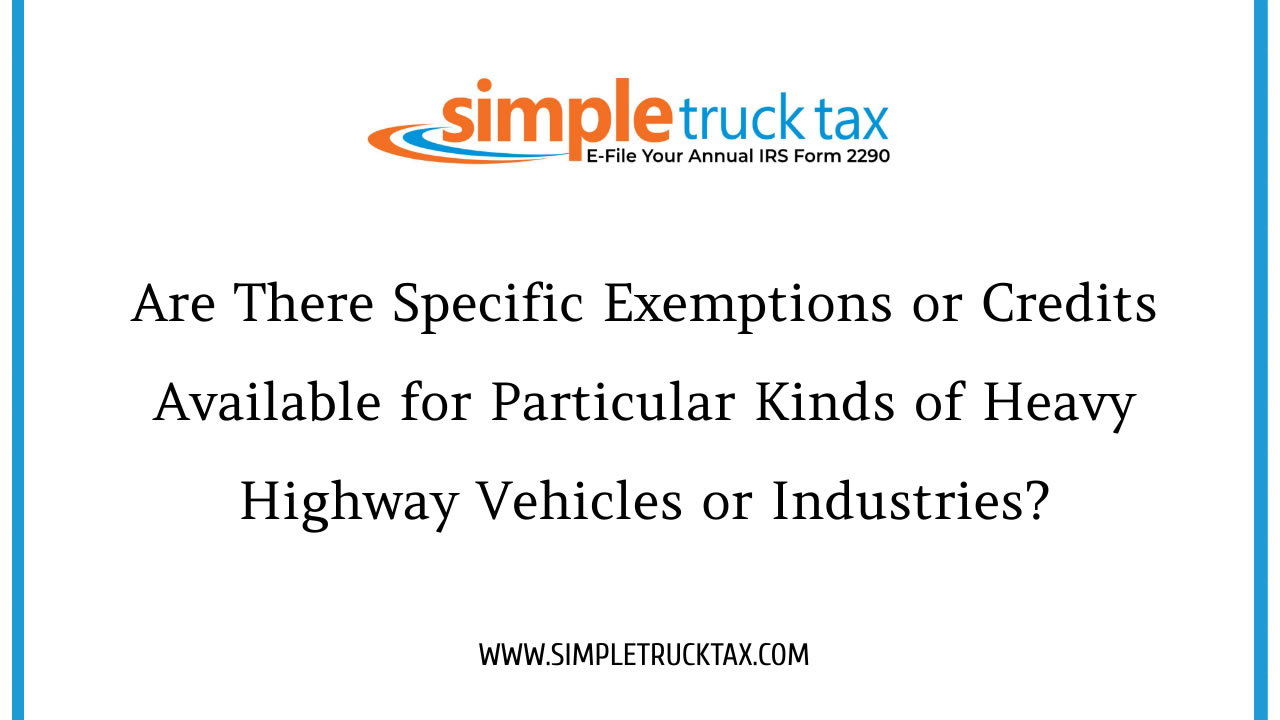11-04-2024
Are There Specific Exemptions or Credits Available for Particular Kinds of Heavy Highway Vehicles or Industries?
There are significant usages of heavy highway vehicles in long distance transportation of products as this supports many different industries. To help minimize the cost of doing business, the IRS provides numerous exemptions and credits in place for specific kinds of vehicles and industries. These can be significant for truck owners, fleet operators, and owner-operators trying to better manage their tax obligations. Here's a closer look at how specific heavy highway vehicles or industries might qualify for certain exemptions or credits under federal tax regulations.
Understanding the Heavy Vehicle Use Tax (HVUT) and Form 2290
Heavy Vehicle Use Tax, or HVUT, is a tax placed on all heavy vehicles, in which taxable gross weight equals 55,000 pounds and more that have to pass through the public highways. The HVUT is collected by the IRS through form 2290 for eligible owners of these vehicles to file and pay yearly. Various exemptions and credits do apply to HVUT though depending on purpose of vehicle usage level or sector industry.
Common Exemptions under HVUT
While HVUT generally applies to all of them, there are specific exceptions made for special cases depending on different types of vehicles. Here is one of the most common exemption criteria:
Low Mileage Vehicles
This has exempted vehicles that move less than 5,000 miles per year for private vehicles and 7,500 miles for farming-related ones to pay HVUT. Any owner whose vehicle is driven less frequently will be tax-exempted. Filing Form 2290 bears a label of "suspended vehicle" since there exists less mileage on their trucks, hence no tax collection required to be made.
Farm vehicles
Agricultural vehicles are otherwise referred to as "farm vehicles". These have high relief provisions under HVUT. Mainly agricultural vehicles that usually carry livestock, crops and other products that farmers engage with are levied under low mileage thresholds of 7500 miles. Besides they are qualified for exemptions to the tax system on grounds that they mainly do not frequently use the highway because the farms are mainly privately used.
Logging vehicles
Other vehicles that are used only to haul logs from forests to processing facilities also qualify for a reduced tax rate. The IRS recognizes logging vehicles travel typically on tough, private roads with very little highway use and can qualify for a reduced HVUT rate. A logging vehicle must be directly involved in logging operations and have specific physical features, such as tires suited for rough terrain, to qualify.
Government-Owned Vehicles
All heavy vehicles owned and operated by the federal, state, and local governments are totally exempt from HVUT. This exemption recognizes the public service nature of government-owned vehicles, which are used for important functions without generating private-sector operating profits. Vehicles operated by Native American tribes for governmental functions on reservations also qualify for this exemption.
Nonprofit Organizations
The HVUT may exempt nonprofit organizations committed to charitable, religious, or educational causes if these vehicles are used in pursuance of such goals. This would mean tax obligations would not absorb all of their resources, and there would be a higher ability to allocate resources to such causes.
Credits Available for HVUT Payments
Under some circumstances, owners might have paid the HVUT only to later qualify for credits owing to unexpected situations. Credits are incredibly valuable for fleets managers and owner-operators seeking cash flow maximization. The following are some of the most common scenarios under which credits may apply:
- Vehicle Sold, Stolen, or Destroyed The unused portion of the HVUT can be claimed by an owner if the vehicle is sold, stolen, or destroyed before the end of its tax period. For example, a truck that is sold within six months of the taxable year allows an owner to claim credit for the remaining six months of the tax period. In this way, owners are not penalized for the tax periods during which they do not operate the vehicle.
- Low Mileage Credit In case a vehicle was initially planned to have mileage that exceeds the 5,000-mile threshold (or 7,500 miles for agricultural use) but does not, there is a low mileage credit. This credit allows owners to recover HVUT already paid in advance for a vehicle that ultimately qualified for the low mileage exemption.
- Form 2290 Error Corrections Owners can correct mistakes from original Form 2290; examples include an error regarding the gross weight or failing to understand the type of usage for the vehicle while completing the form by claiming this on an amended return. This would result in a situation of overpayment; a credit or refund is then possible.
- Vehicle Transfer to Another Owner Ownership change of a vehicle during the taxable period means that the new owner will be charged with HVUT. Proportional credit could be obtained to the original owner so that the taxpayer will not be double taxed on passing ownership.
Credits and Incentives Industry-Specific
In addition to the general exemptions and credits, there are more specific sectoral federal incentives that are targeted at energy efficiency or emission reduction. Among the sectors is heavy vehicles; the following incentives are associated with it:
Electric and Hybrid Heavy Vehicles
The federal government gives incentives to clean technologies like tax credits for heavy-duty electric or hybrid vehicles. Though these incentives change with time, they generally reduce the overall tax burden for fleets switching into cleaner technology, especially where such vehicles are used for commercial or public transportation sectors.
Alternative Fuel Tax Credits
Alternative fuel vehicles, such as those running on CNG or hydrogen, may receive credits or rebates in HVUT and other excise taxes. Credits and rebates differ by state, but generally offset some of the costs of developing alternative fuel technology, often specifically in public transportation or heavy industry.
Renewable Energy in Agriculture and Forestry
Tax incentives provided for farm and forestry machinery include special provisions encouraging the use of renewable energy. Biodiesel tax credits apply to farm equipment or heavy trucks using biodiesel blends. The tax credits save the operating cost of agricultural firms while promoting renewable energy sources.
Application for Exemptions and Credits
Applying the exemptions and credits requires being careful in filling Form 2290 and keeping track of mileage and usage. A business owner or operator can directly apply for exemption on Form 2290 by making the appropriate choice under low mileage or a particular type of vehicle. Credits usually need further documentation or amended filing. For instance, a vehicle should be reported whenever it is destroyed or sold for the reporting period because it is evidence of that event which in turn is proof of that mileage claim.
Using, or even consulting, your tax professional/ e-file service will certainly make these things much more manageable also. Other automated tool tracking services assist in identifying and tracking mileage and use correctly to properly report data consistent with these guidelines of the IRS as well as may help you avoid the human error reporting.
Maximizing Tax Savings through Exemptions and Credits
HVUT exemptions and credits can provide significant savings for vehicle owners and fleet operators if those opportunities are aligned with their business needs. It may help the operator in better control of his tax liabilities, thus improving cash flow and reducing overall operating expenses if he knows how the exemptions are allowed, such as by type of vehicle, industry, or level of usage. Keeping track of evolving tax policies and incentives, especially in emerging technology such as electric trucks or alternative fuel vehicles, can further enhance long-term savings.
Tax compliance is important, but maximizing exemptions and credits that are eligible helps to alleviate the financial burden on heavy highway vehicle operators to focus on efficient, profitable operations in an increasingly competitive market.
Note: For more information, visit IRS website


